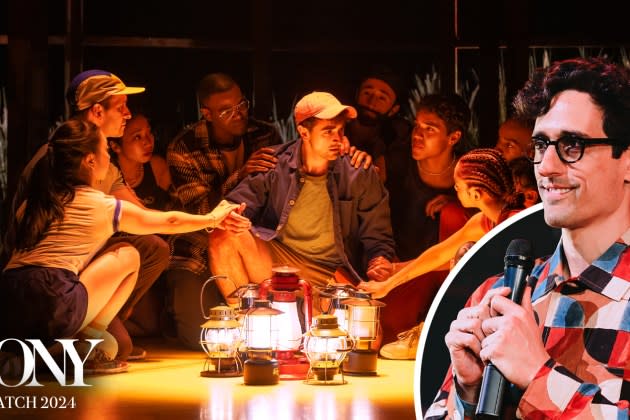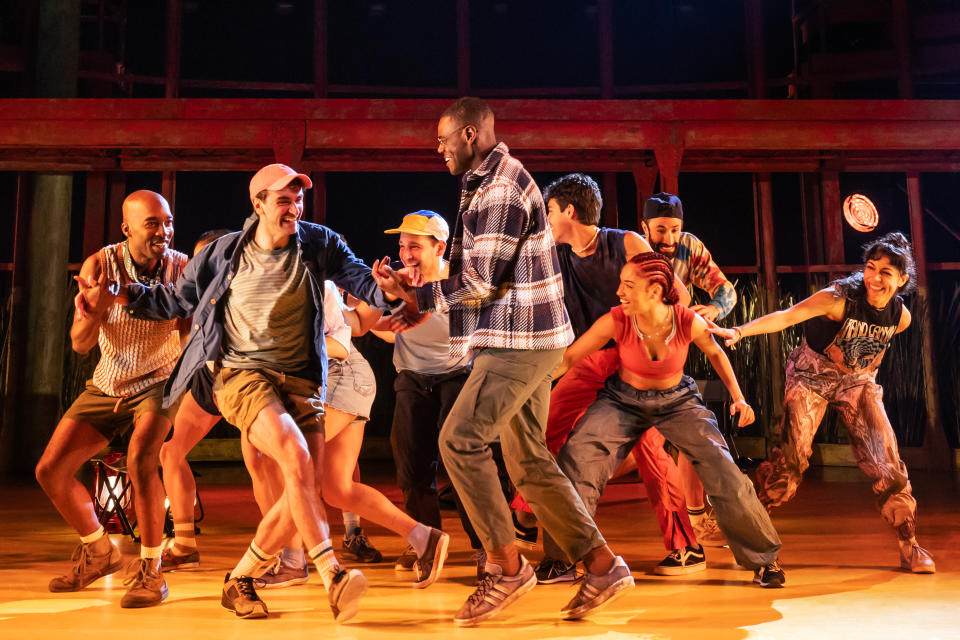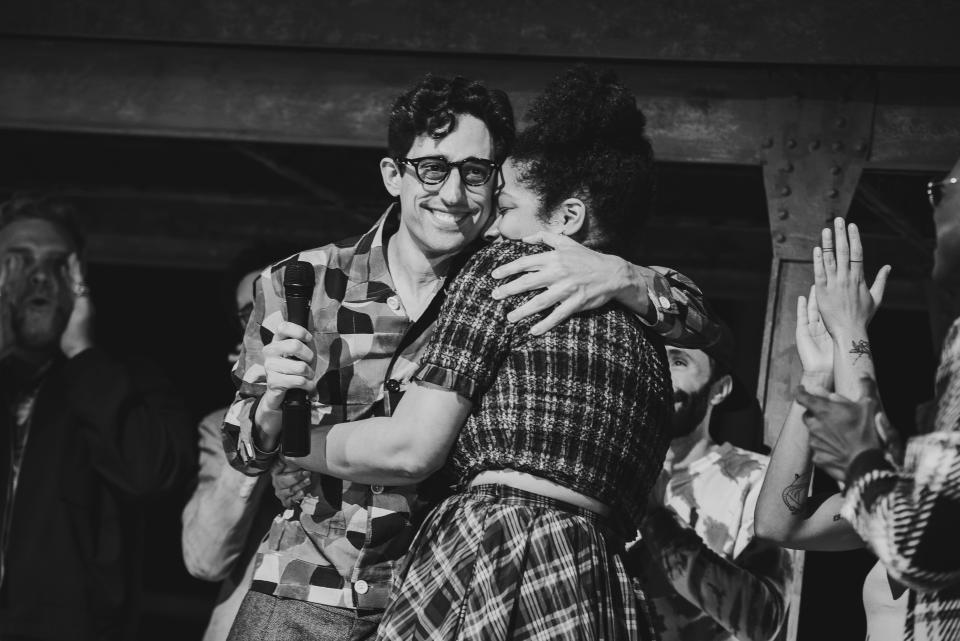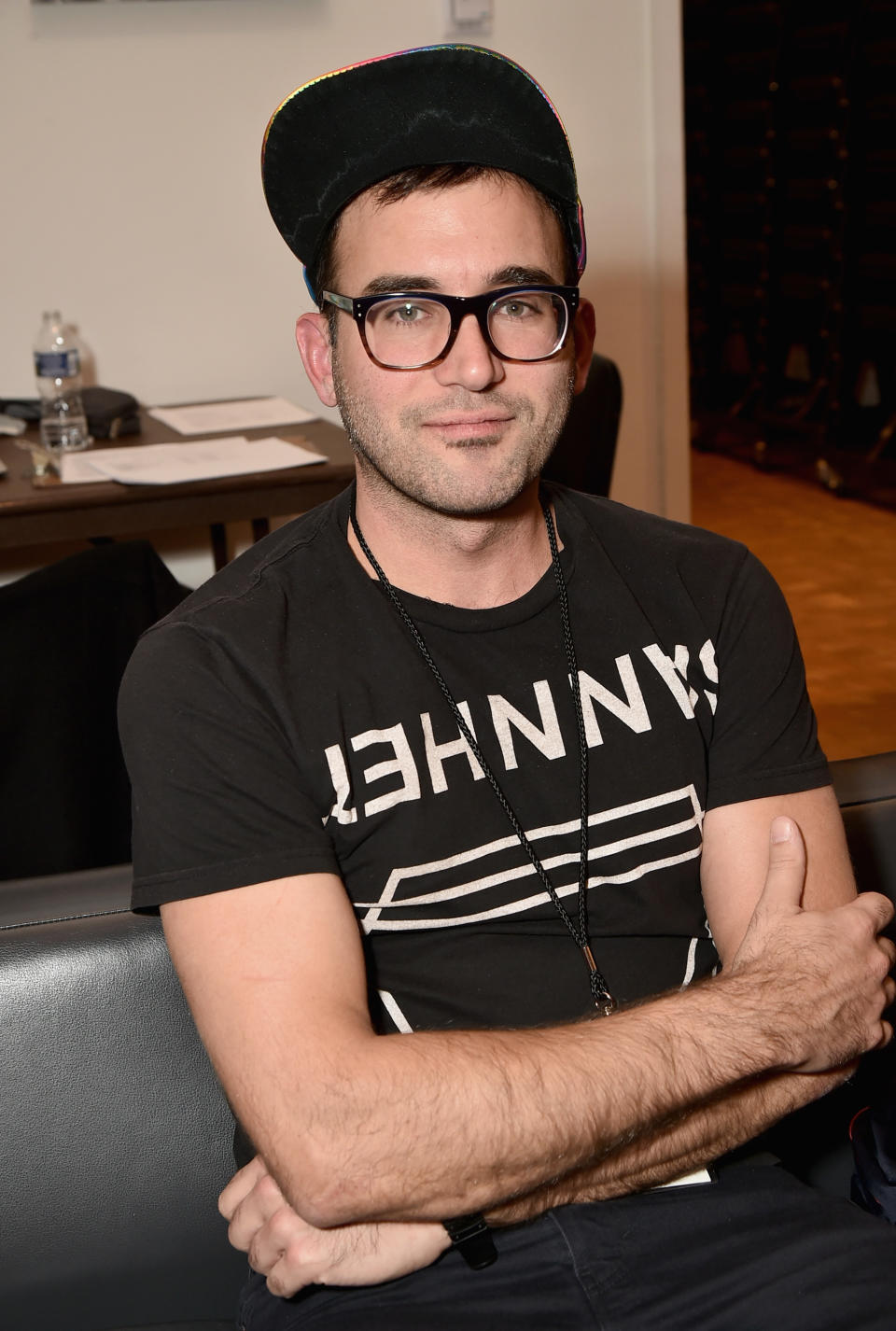The Making Of ‘Illinoise’ And The Guiding Vision Of Sufjan Stevens – Tony Watch Q&A With Justin Peck

Illinoise, the dance-musical hybrid nominated for four Tony Awards (including Best Musical) is the seventh collaboration between Justin Peck, the resident choreographer and artistic advisor of the New York City Ballet, and his old friend and creative partner Sufjan Stevens, the indie singer-songwriter turned Oscar nominee (for his song “Mystery of Love” from 2017’s Call Me By Your Name). But it’s safe to say this quirky gem is something unique. Unlike the duo’s previous projects, which include commissions from major dance companies across the country, Illinoise isn’t exactly a ballet. It’s not exactly a musical either.
Putting movement to Stevens’ 2005 album Illinois and its captivating mixture of indie folk, rock and orchestral arrangements – not to mention lyrics that combine the autobiographical, the historical (figures from the state’s past and landscape pop up frequently) and the fanciful (zombies, UFOs, Superman, a predatory wasp) are fashioned into an episodic narrative without dialogue. It’s a work that remains faithful to one of the prolific Stevens’ most beloved collections while exploring connections and avenues the songwriter could never have envisioned back in 2005.
More from Deadline
Broadway Spring 2024: Sufjan Stevens ‘Illinoise’ & All Of Deadline’s Reviews
'Once Upon A Mattress' Starring Sutton Foster Sets Broadway Run, L.A. Engagement To Follow
And, to state the obvious, unlike their previous collaborations on ballets such as 2014’s Everywhere We Go (2014) and Year of the Rabbit (2012), Illinoise is on Broadway, a bit of an eccentricity in and of itself. It’s as hard to categorize – the above-stated “dance-musical hybrid” seems to be the shorthand of choice – as it is enticing in its emotional power and elegant beauty.
There’s one other thing: Unlike previous collaborations between Peck and Stevens, Illinoise was largely developed without active, direct input from the songwriter, whose year, to put it ludicrously simple, has been demanding. His longtime romantic partner, Evans Richardson, died in April 2023 (Stevens’ album Javelin, written prior to the loss but released just months after, is dedicated to Richardson). Later that summer, Stevens lost the ability to walk, a temporary but no less life-changing result of Guillain-Barre syndrome, the effects of which Stevens continues to battle.
In this interview, Peck, whose collaborations with Stevens are being celebrated by the New York City Ballet to mark the 10th anniversary of Peck’s appointment as Resident Choreographer with Year of the Rabbit performances on May 18 and May 26 and presentations of Everywhere We Go this fall, describes how Illinoise came together, the challenges it overcame and the collaborative effort that includes a story and book he wrote with Jackie Sibblies Drury, the Pulitzer Prize winning playwright of Fairview, musical arrangements by Timo Andres, musical direction by Nathan Koch and of course the songs and the spirit of Sufjan Stevens.
Illinoise has been nominated for four Tony Awards – Best Musical, Best Choreography (Peck), Best Lighting Design/Musical (Brandon Stirling Baker) and Best Orchestrations (Andres).
Also of note: This interview took place a week after the untimely death of Illinoise production stage manager Thomas J. Gates, who was struck and killed by a train, leaving the Broadway company devastated but determined.
This interview was condensed and edited for length and clarity.
Illinoise is playing at Broadway’s St. James Theatre
DEADLINE: First let me offer sincere condolences. I know this must be a rough time for you with the passing of Tom Gates. It was a shock.
JUSTIN PECK: Thank you. Yeah. It’s a bit of a whiplash the whole thing, but you know the company has been really great and supportive of one another. We’re taking it one day at a time right now.
DEADLINE: Is there anything you want to say about him personally that you’d like people to know about him?
PECK: He was just the kindest man. I remember doing background calls to other people in the community when I was looking to hire a new stage manager and that’s the one thing everyone said about him. He always brought this sense of kindness with him. That role is kind of like a captain of the ship and is responsible for so much and so many and for someone to come into our project and bring all that kind of focus and organization but also bring this air of kindness was really rare and so welcomed. It was very devastating and shocking to hear about what happened, and our thoughts are with his husband Rick Steiger and their whole family right now.
DEADLINE: The show itself is about many things but one of those things is loss and how we deal with it and struggle to come back from it. I’m wondering when something like the loss of Thomas happens, does that inform the show in a new way, or am I, as an audience member, projecting that?
PECK: I definitely think it has some effect on the performances and in a strange way we’re lucky that this show is something that holds the experience of grief and grieving in it. It’d be a different thing if this were some slapstick comedy and the cast had to go out there and provide and perform that sort of performance but in our case it is so much about grieving and finding a catharsis through the act of sharing and not remaining isolated.
I do think that has been a saving grace for this moment, especially for the company, and also it has deepened their performances and I think the show will never be the same and that’s not a good or a bad thing. It’s just a changing, evolving thing and it’s such an ephemeral experience. Every performance is unique, and these artists bring their full range of emotions to the material each night and depending on what they’re going through it’ll feel slightly different. Obviously, the last week of performances has been quite profound just coping with this loss, with losing someone who’s just so in the day-to-day of these artists’ lives. It’s been heartbreaking and also kind of beautiful to get to witness.

DEADLINE: I think with Illinoise, although it’s fictional, there does feel a certain connection to and reflection of real life – Sufjan Stevens’ life specifically. It doesn’t take a lot to see Sufjan in the main character Henry (Ricky Ubeda) – who wears a cap just as Sufjan so often does. The character of Henry’s boyfriend Douglas (Ahmad Simmons) put me in mind of Evans Richardson. I wonder, are those kind of things purposeful? Are you trying to draw parallels with real life?
PECK: Those traces in terms of how they associate with Sufjan specifically are not purposeful. I wanted to give myself the parameter of, like okay, only draw from his music. There are so many clues in his music but like you said none of it is explicitly spelled out, it leaves room for interpretation either as a listener taking it in and bringing your own personal self to it or for me and Jackie [Sibblies Drury] as artists who are actually honored with the task of interpreting this music and expanding it into the world of a theatrical experience.
It’s been really interesting to see what people bring in terms of their own knowledge of Sufjan, because even like just putting a baseball cap on a character is something that so many people…I mean, it’s a very common thing for a young guy to be wearing a baseball cap but at the same time you’re right, Sufjan wore baseball caps and one might equate those two things as the character representing Sufjan in some way. I’m sure subconsciously there is some of that that runs through it and we can’t deny that there is absolutely a lot of Sufjan’s personal background and story and thoughts and feelings in the music, but I think in terms of this musical, a lot of it is personal to myself and my own story and also to Jackie Sibblies Drury and her experiences, and we were able to kind of make up this world and these characters and draw connections and build character dynamics and relationships in a way that feels like sort of a miracle because we were able to do it without losing any of the music. Part of our goal was to maintain the experience of the album in its entirety for audiences.

DEADLINE: I’m wondering if you feel an obligation to fans’ interpretations – even to a sort of collective interpretation – of the songs on the album? I’ve always assumed, for example, that “Casimir Pulaski Day” was the story of a school friend of Sufjan’s who died of bone cancer, but that’s not the story Illinoise tells.
PECK: That’s a good question and I do think that there are a lot of strong feelings around the music and a lot of very passionate fans of the music, and it definitely felt like a big responsibility to take this music and try to do right by it and present something that was compelling and that maybe fans of the music would embrace. But I think it would have been a trap to try to make the version that appeals to the majority of those people because it would probably be something that departs from my own personal interpretation of the music, and especially how the music has fallen into a creative process with the storytelling as we built it out between myself and Jackie.
But there’s definitely an awareness of all that. For me, many, many hours, days, weeks, were spent ruminating over the lyrics, reading the lyrics and allowing this kind of osmosis of the lyrics to start to float to the surface and grab hold of me. Sometimes it would be one lyric that could act as a tent pole to build out a whole scene. The music is poetic and can be interpreted and impressionistic, and I think that influenced the impressionistic approach that we’ve taken with the storytelling. Again it goes back to the structure of how we were able to tell an entire narrative story using these songs.
Of course that meant that we had to take certain liberties at certain moments, always from a place of respect and long consideration. It felt like each song held so much, like this whole world, and what I had to do was focus my brain on one pinpoint and move through that pinpoint to navigate our story. That meant potentially ignoring other aspects and other lyrics of certain songs. If you look at like a song like “Illinois,” it’s so dense. There’s so much in the lyrics and references and places and history. What I did with a lot of the songs was boil it down to, what’s the one or two sentence log line being expressed in this song or in this number and how do we translate that and expand it into theatrical staging.
DEADLINE: In a song like “Decatur,” for example, Sufjan on the album is singing about his stepmom, and I would imagine you don’t want to bring a stepmom character into the campfire setting, it wouldn’t make sense. There must have been those sort of practical considerations as well.
PECK: Yeah. In that song he talks about his stepmom and that felt to me like it might be an adolescent kind of conversation that two young guys might be having at the outer edge of the town by the train tracks while they were trying to pass the time and work through their own boredom. The aesthetic of that song feels almost like the film Stand By Me. And so that became a great way to set up the friendship and emotional feelings between the Henry character and the Carl character.
At times we wanted the show to feel almost like you’re watching a silent film, so that the album and the music could underscore action that was happening before our eyes…We’re presenting the arc of a story and [the visuals and the music] come to the brain separately and then combine with the personal experience that the audience brings to what they’re seeing. It’s actually something I didn’t realize until very late in the process.
DEADLINE: One of the album’s songs that I have to admit I never really quite got was “John Wayne Gacy, Jr.,” at least its ending. [The final verse in the song about the infamous Chicago serial killer: “And in my best behavior/I am really just like him/Look beneath the floor boards/For the secrets I have hid.”] But when I saw what you did, it was like, Oh of course, this is a murder ballad and they’re sitting around a campfire telling it like a ghost story. Tell me how you came to that.
PECK: Well, it’s very much from the point of view of a queer character, and the whole story of John Wayne Gacy is a very threatening story to the queer community in a number of ways. I think it’s almost like the character tells the story and he’s terrified by it but he also feels like he has to face his fears and get past it to some extent, and it triggers him and he has this mini panic attack. It’s a really beautiful moment in the show because we hear the sort of erratic breath delivered by [singer and guitarist] Sharon Nova and we see it expressed by this young man character, and through the care of his community, especially his queer community, he’s able to find stability and balance once again. The fear is not something that disappears but it’s something that can be lived with.
To me what’s exciting about that moment is its sort of a primer for the audience to take in the fuller arc of Henry’s story. The character who tells the John Wayne Gacy story and the Henry character both share the same the movement language – the mini panic attack after “John Wayne Gacy” is the same language as the panic attack that Henry has in “Predatory Wasp” when he’s dealing with like his lost best friend and his dead other best friend from home, and the fact that he’s left that all behind and he’s chosen this life in New York. It just becomes too much for him. So it kind of helps guide the audience into the language and the expression of this show. One of my questions was always Are people going to get this? How do we allow their eyes and their hearts and their minds to adjust to not only this world but the language of delivery?
DEADLINE: Obviously the album doesn’t have a plot, per se, so how did you come up with the overall storyline for the musical and the individual stories that accompany the songs? Was that you? Was that Jackie? Was it Sufjan?
PECK: It really started with the question of is there a way to excavate a storyline from this album without changing the [song] order of the album. Then we started to hone in on this coming of age story and that the majority of these songs could work well in regards to telling that coming of age story. Sufjan wrote this music at that time of his life when he was coming of age and finding his sense of self in the world and reestablishing himself in New York City.

So it started to reveal itself in a way but not for every song, and we felt like whichever song didn’t really work for that, we found its own kind of imagination that worked well in terms of telling a short story. That’s really where this idea of campfire storytelling came to be, and that was the big aha moment that unlocked our show. There was a version at one point where we did keep the order of the album, so there was a pause in Henry’s story that we felt took away from the effect of losing oneself inside of his story. By moving two songs – the Superman story and the zombie story – to the front of the show, not only does it help to train the audience in what this world is and how the storytelling works, but it allows us to tell Henry’s story uninterrupted.
DEADLINE: I know you worked with Sufjan before, and my understanding is that he was more directly involved in some of the earlier collaborations that you’ve done with him. Did he have any involvement in the development of Illinoise? Did he ever say, no that’s not what I would do or that’s not how I would act?
PECK: He was very deliberate about choosing to not insert himself in the process of it. He was available when we were first developing it, strictly from a music standpoint. So we had a lot of conversations about how should the music be arranged and who should do the orchestrations, and he was even planning to come and work with the band when we were first presenting the show up at the Bard Fisher Center but that unfortunately came shortly after the death of his partner, so he had to bow out at that point. He just had a really hard year.
So from that point forward, with that death and also his own struggles with his health, he wasn’t super present, but he did come to see it right when it opened on Broadway, so I was able to share it with him. He was super supportive of it and just had really beautiful things to share about the show, especially how the music was being delivered in it. It was a bit of a relief for me at that point.

DEADLINE: Can I ask you to give us any updates on his health, and his spirits?
PECK: It’s been a very long road for him and a very trying road, but I think he’s doing relatively well and he seems to be in good spirits. He’s been able to hear some of the songs [from Illinois] that he hadn’t thought about in a long time and say, like, why did I write that lyric? Just really sweet moments like that where you’re like, oh, this is a real human who’s kind of able to take in something that he wrote probably what feels like a lifetime ago.
And his health is on the mend. He’s back to walking and he just wants to be physical again. He kept saying “I just want to be able to run again,” and I know he’ll get there. We’re all here for him and sending him energy.
DEADLINE: I’m very glad to hear that. What was his reaction – and yours and everyone’s reaction – to the Tony nominations? Could you have imagined when you started all this that you would be up for Tony Awards?
PECK: I guess we never fully knew where this show was going to end up. We didn’t know it would even make it to Broadway. I’m a theater lover and theater is really how I got into all of what I do…
DEADLINE:...and a Tony winner I should mention…
PECK: Yeah. So, in the back of my mind one of my dreams was for this to be able to exist in that world, but again it’s not the most obvious musical blockbuster. It’s kind of like this little show that could, and it sort of defied all odds because so many shows nowadays have to be based on existing IP or be very celebrity driven and we don’t really have any of that with this show. It’s really just a little show that comes from the heart and even the means of delivering it, the scale of the show, is much more frugal that that of a typical Broadway musical. We’re telling these stories with very bare design support, you know. We have a picnic blanket that becomes a Superman cape. We have some lanterns that come together and if you squint it kind of looks like a campfire. But at the same time I feel like those are the kinds of shows that I always loved growing up. The ones that allow for the audience to use their imaginations, and that trust the audience.
So we’re thrilled that this kind of show is being embraced both critically and with all the award nominations, and what I hope is that it can inspire others to create Broadway musicals that are more outside of the box, and also for producers and people who finance these things to take a chance on shows like it. I’m really honored and hopeful for what those nominations signify.
DEADLINE: Where does Illinoise go from here? Do you foresee future productions?
PECK: I don’t know exactly at this point, but I would love for it to go to the West End in London for a run. I just have a feeling that the audiences there would really enjoy it. And we are talking about the prospect of a national tour as well, but nothing is official at this point. We’re just trying to stay focused on our current Broadway run. It was a bullet train to get it here.
Best of Deadline
Hollywood & Media Deaths In 2024: Photo Gallery & Obituaries
2024 Premiere Dates For New & Returning Series On Broadcast, Cable & Streaming
2024-25 Awards Season Calendar - Dates For Oscars, Tonys, Guilds, BAFTAs, Spirits & More
Sign up for Deadline's Newsletter. For the latest news, follow us on Facebook, Twitter, and Instagram.


